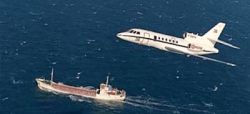WASHINGTON, April 11, 2011 — The United States continues to support NATO efforts in Libya, as Moammar Gadhafi’s forces continue attacks on Misrata and Ajdabiya.
Gadhafi has said he will accept a ceasefire, but “the latest reports are that Gadhafi is continuing to carry out attacks,” said Pentagon spokesman Marine Col. Dave Lapan.
“Talk of a cease fire is just that: Talk,” Lapan added.
The African Union has proposed a ceasefire. “Since the start of the crisis, NATO has been in constant touch with the African Union as well as other regional and international organizations,” NATO Secretary General Anders Fogh Rasmussen said today in Brussels. “I want to be clear: There can be no solely military solution to the crisis in Libya. NATO welcomes all contributions to the broad international effort to stop the violence against the civilian population. Any ceasefire must be credible and verifiable.”
NATO aircraft are striking with care and precision while minimizing the danger to civilians, Rasmussen said.
“This is in stark contrast to the pro-Gadhafi forces,” he said, “who are besieging their own cities and shelling city centers.”
Since April 9, NATO aircraft have flown almost 300 sorties, the secretary general said, destroying 49 tanks, nine armored personnel carriers, three anti-aircraft guns and four large ammo bunkers.
Meanwhile, Gadhafi’s forces continue offensive operations against rebels in eastern Libya. The no-fly zone has blunted the effects of the regime force’s attacks, but has not ended them.
“We’ve talked all along about the nature of a no-fly zone and how that restricts the regime’s forces, but that doesn’t stop them,” Lapan said.
NATO officials said the Libyans are using schools and mosques as shields for their armored forces. The proximity to civilians means these targets are off-limits for NATO.
The DOD comptroller estimates the cost of U.S. operations in Libya to be $40 million per month. Total U.S. cost from the beginning of operations in mid-March through April 4 was $608 million, Lapan said.
American forces are not conducting strike missions in Libya. U.S. forces are supporting NATO with air-to-air refueling, reconnaissance and surveillance capabilities and unmanned aerial vehicle support. U.S. ships are also participating in the arms blockade off Libya in the Mediterranean.
Defense Secretary Robert M. Gates said before Congress on March 31 that he did not expect the department would need a supplemental request to fund the operation. The department is working on a funding strategy.
Source:
U.S. Department of Defense
Office of the Assistant Secretary of Defense (Public Affairs)

 von
von 